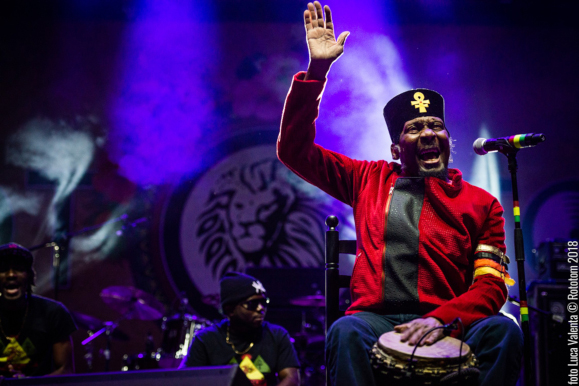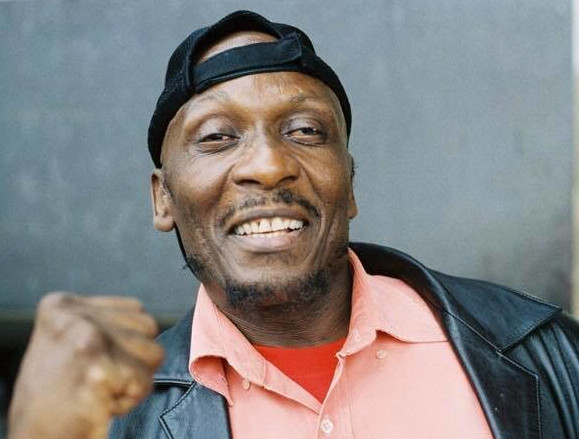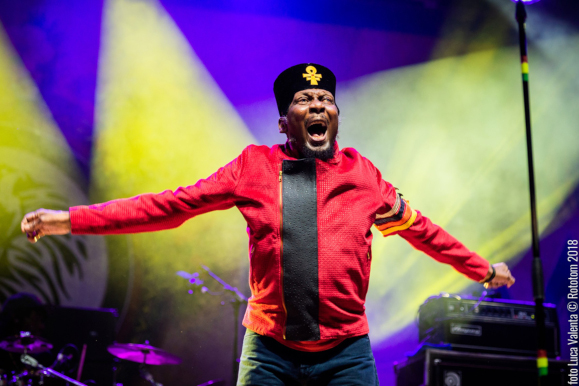Articles about reggae music, reviews, interviews, reports and more...
Interview: Jimmy Cliff, Still Going Strong
- Home
- Articles
- Interviews
- Interview: Jimmy Cliff, Still Going Strong

Interview: Jimmy Cliff, Still Going Strong
"I haven’t written my best songs as yet... They will come"
Jimmy Cliff may have done it all, but he still has hopes and dreams. Jimmy Cliff may not be as agile as he was, but he can still fill the stage with vim and vitality. Jimmy Cliff may be old, but his demeanour and disposition remain youthful and enthusiastic. Jimmy Cliff may be losing his sight, but he still has a vision of far into the future.
Of course, for many, the comparison of the ‘private’ Cliff with the more sociable Bob Marley is one of the most intriguing aspects of his story. The Cliff-Marley relationship began when – through the intervention of Desmond Dekker - Cliff initially auditioned Marley ‘and got his songs recorded’. Entrepreneur Chris Blackwell – who played a crucial role in opening doors for Marley and many more besides – initially groomed Cliff for stardom. But before he could capitalise on Cliff's rising star, he had left Blackwell’s Island records for EMI, citing the fact that Blackwell was spending too much time on his rock catalogue. Related thereto, it’s also alleged that Blackwell was going to package Cliff as the new Jimi Hendrix – the black musician with the supercool swagger. This tallies with Cliff’s view that Blackwell ‘had his own concept of how he wanted to market Jimmy Cliff, and I had my own concept’. But Blackwell recalls that ‘Jimmy Cliff left .. and then Bob walked in’. In fact, a week after Cliff left Blackwell’s label, Marley showed up (stranded and penniless) in Blackwell's London office. Cliff’s departure was prompted by a $50,000 signing on fee with EMI, apparently leaving Blackwell, who had ‘been putting a lot of energy into him’ very ‘bitter’. Hence, he ‘transferred the whole plan’ he ‘had for Jimmy over to Bob’, whilst Cliff reflects that ‘the songs I was writing didn’t really match the image he wanted. So, we were both bitter’.
Though all three personalities survived the experience, only Cliff still enjoys a live presence as a performer in the reggae arena. Hence, in the course of his recent world tour, Cliff took to the stage at ROTOTOM 25 outside Valencia, Spain, where - despite his years – his show was a revelation. The lengthy set opened with the spine chilling Nyahbinghi styled ‘Bongo Man’, before he proceeded to belt out classic hit after classic hit to the audience’s delight. Teasing the assembly of more than 30,000 punters, Cliff asked ‘do you know this song?’, before bursting into ‘The Harder They Come’, followed by ‘Johnny Too Bad’, with moving versions of ‘Many Rivers To Cross’, ‘Wonderful World, Beautiful People’ and ‘You Can Get It If You Really Want’ keeping the audience on their toes thereafter. Clearly, this artist has lost none of his musical prowess. After this mammoth headline performance, Cliff generously took time to talk with United Reggae.

The enduring impression left after this interaction is that Cliff is a modest, considered, intelligent, righteous, high-achieving and very dignified and determined man. The determination that propelled him from Jamaica’s countryside to international stardom as an actor and a musician still burns brightly. This determination, that he has carried from his youth, spawned the classic ‘Many Rivers To Cross’. It was penned as a reaction to the trials and tribulations of his early career, when he wrote: ‘Wandering I am lost, as I travel along the White Cliffs of Dover’, recalling the number of times that he crossed the English Channel to the continent, ‘with very big hopes .. fading’. That song was ‘fuelled by frustration’.
Hence, Cliff is a true inspiration to all those in despair, that ‘You Can Get It If You Really Want’. Though currently recuperating after an accident, all reggae lovers will support the sentiment that ‘long may he live’, to realise his outstanding ambitions, whilst continuing to give hope to and set good example for those on the brink of throwing in the towel. And the good news is that he’s already slated to headline Summerjam 2019. Bring it on!
Congratulations on your career. What has been your greatest achievement in music?
Thank you. My greatest achievement in music? Well there wasn’t one particular one, I would say, you know? It’s always a great thing musically when an artist gets a Number 1 song or a Top Five song or even a Top Ten song in the United Kingdom or the United States. And when the artist gets that hit in both countries it’s a great thing. So, I did get it in both, with ‘Wonderful World’ and also with the soundtrack from ‘The Harder They Come’. That was very good, very exciting and very important.
What has been your greatest achievement in life?
[With a broad smile] Staying alive!
When you were a young man, you had many aspirations or dreams. Are they all sorted?
Are they all fulfilled? Nah! Remember, they were big dreams. So, they’re not completed yet. I mean, I couldn’t say that I haven’t conquered the world. That was really the goal. But I haven’t conquered it completely. Because the first thing that I wanted to do was to act. And I still intend to win the Grammy! You know? I mean, the Oscar award. I want to win it. So that has not been achieved … yet. And strange as it may seem to some people, I haven’t written my best songs as yet. But I would remind people that there was a great composer called Beethoven, who wrote his best pieces when he was deaf. And that is an amazing thing to do. So, one might say: ‘Jimmy, you’re very much your man now, when you think you can still write those songs that you think will be your best songs.’ Yes, I do. They will come.
 The secret is that I’m driven. I’m driven because I haven’t achieved everything
The secret is that I’m driven. I’m driven because I haven’t achieved everything
You have had No. 1 hits all over the world, you’re a movie star, an inductee into the Rock & Roll Hall of Fame, been granted the keys to Montego Bay, had a street named after you, won Grammy awards, been conferred with a doctorate and are still going strong in your 70s. What’s the secret?
Quite honestly, the secret is that I’m driven. I’m driven because I haven’t achieved everything. When I’ve achieved all my ambitions, then I guess that I will have done it and I can just say ‘great’. But I’m still hungry. I want it. I’ve still got the burning fire that burns brightly inside of me – like I just said to you. I still have many rivers to cross!

Would you have been even more successful if you were less creative and had stuck to one musical genre?
Ah! That’s a very good question, a very good question. But I hardly think so. Why? Because as an artist, I am a creator, a creative artist. I couldn’t be anything different. I’m an innovator, I always like to innovate. I can’t continue doing the same thing all the time. I like to be a bit different and I must be true to myself.
 Because as an artist, I am a creator... I couldn’t be anything different
Because as an artist, I am a creator... I couldn’t be anything different
You’ve recorded with many different styles of musicians. Do you have a favourite memory?
A favourite memory? No, not as such. But there are some fond memories, such as doing ‘Wild World’ with Cat Stevens. Now there was really good chemistry with that one, with him and me. Also, I recorded the ‘Another Cycle’ album at the Muscle Shoals Sound Studo in Alabama, where I also did ‘Sitting In Limbo’ along with a few other songs. Of course, what I’ve done in Jamaica with, you know, ‘Wonderful World’ and ‘You Can Get It’ and those types of songs are sweet memories. But in my life, there were so many good memories, but not actually any single one ‘stand out’ memory.
What upsets you most in music?
[He laughs heartily] I’m a perfectionist. And I wish I wasn’t, really. Sometimes when I come off stage, and everything hasn’t gone according to how I feel it should, I find it hard, so hard, to get over it.
Even at 70 years of age?
Yeah! You should go ask my friend [the tour manager] who just left. I got so angry with him just the other day!
What upsets you most in life?
I have this thing inside me for justice. I want justice. I seek justice in life. I don’t know where I get it from. Maybe it comes from my family growing up – they were a kind of Christian people. My father was a good Christian, but apart from his religious inclination, he was really a just man. I think if he had only been a religious man, he would still have been a just man. And so, I think I’m made up of thirty-three and a third degrees of my father, thirty-three and a third degrees of my mother and thirty-three and a third degrees of myself. That’s how the genealogy works.
 I’m a perfectionist. And I wish I wasn’t
I’m a perfectionist. And I wish I wasn’t
Would you describe yourself as a religious man nowadays?
No, no – not at all. I was a very good religious man. Yes, I was. But I’ve outgrown that school long ago, a long time ago. Yes, it’s about getting to know oneself. The key question is ‘Who am I?’ I was searching for meaning and I went through all the religions and when I say ‘all’, I mean them all. I became part of the Nation of Islam for a while and I even went to India and spent time in the ashrams and I studied Shaolin kung fu with two different teachers. Yes sir, I went through them all. But now I know that my way is the way of my ancestors from Africa.
And you’re still a very spiritual man.
Oh! I’m still very spiritual, yes.
Favourite politician?
Basically, I don’t like politics, you know? I’m a bit politically inclined, but not to participate in party politics. In my songs I address social or political issues and I’ve always had a global outlook, staying tuned in to what’s going on in the world, as far back as the Vietnam war. So, it’s difficult for me to pick out one politician, because I can pick out some things from a particular one and say some things about them. For example, take Jamaica, I could say Michael Manley [former Jamaican Prime Minister] because I think he was sincere about wanting to help the poor people. I saw that in him. And his opponent, Edward Seaga [former Jamaican Prime Minister], he really loved the arts – and I really appreciated that. I can say the same about P.J. Patterson [former Jamaican Prime Minister] for his efforts at doing something for the poor. So that’s that, but in general such is the nature of politics that it’s difficult to have a favourite.

Least favourite politician?
No. That’s a difficult one to answer. Pass! I'm not a supporter of politics and I don't support any politician. I just believe in right and wrong. I'm from the lower class of society and I support them rather than the upper class. You see, when I was growing up I lived in a corner of my aunt and uncle’s one-room shack and was so poor that I couldn’t even afford long pants. Because it takes less fabric to make short trousers, that’s what I got, but at school they laughed at me for still wearing short trousers!
 I want justice
I want justice
Do you have any view on the British Conservative Party’s use of your song ‘You Can Get It If You Really Want’ without asking for your permission?
Well, the British Prime Minister at the time, what’s his name? Oh yes, David Cameron, he came to Jamaica and he did something I didn’t like. So, I said to him, ‘don’t use my song’. When he came to Jamaica, they were putting to him the idea of reparation [to compensate Jamaicans for Britain’s role in the slave trade] and he said ‘Oh! That’s a long time ago’. And that is so wrong. It’s so wrong, so wrong!
What has been your greatest disappointment in life?
Yet again, there isn’t one. There are a few. And they relate to my career. More than once, I have allowed the record companies to lead me astray a little, where I’ve recorded songs that go against my gut feeling or recorded them in a way that goes against that gut feeling.
Are you happy?
Yes, and it helps that I have 2 children with my wife.
Do you have any remaining ambitions or ‘chapters’ in your life?
To complete my goals. This is important. I am serious about the Grammys and winning an actor’s Oscar. What I am now is a festival act. But I want to move beyond that. And I would like to do what I do in Africa and in some places in Brazil – that is, to perform in stadiums.
Thanks for the interview.
Your accent, you are Irish?
Well spotted. Yes, where you are very popular and where your classic film ‘The Harder They Come’ had its first international (and prize winning) premiere. Thank you.
Thank you.
Read more about this topic
Comments actually desactivated due to too much spams
Browse by categories
Recommended Articles
Latest articles
Recently addedView all
© 2007-2026 United Reggae. All Rights Reserved. Reproduction in whole or in part is prohibited. Read about copyright
Terms of use | About us | Contact us | Authors | Newsletter | A-Z














